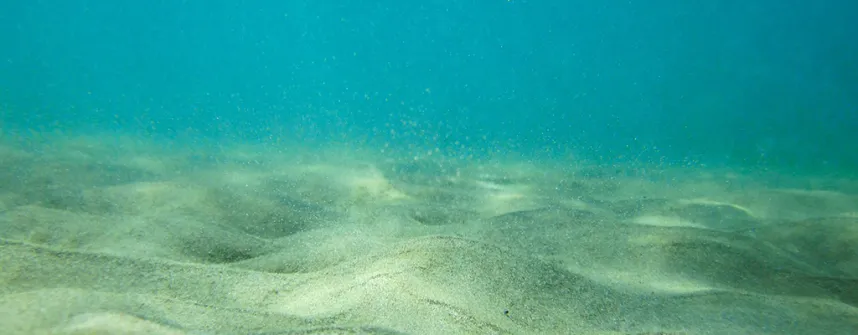New findings help to better calculate the oceans’ contribution to climate regulation
November 14, 2018
Carbon dioxide (CO2) is a major cause of global warming. Researchers use complex computer models to calculate the global circulation of this greenhouse gas. The oceans have a major influence on climate regulation. New research now helps to calculate this influence more precisely. These new findings are the result of a research project by scientists from Jacobs University and the Max Planck Institute for Marine Microbiology in Bremen in collaboration with colleagues from the Alfred Wegener Institute Helmholtz Center for Polar and Marine Research in Bremerhaven, the Marum Centre for Marine Environmental Sciences at the University of Bremen and the University of Gothenburg.
When the porous aggregates sink faster towards the seabed, the generated faster fluid flow can provide more oxygen to the aggregate. Illustration: Science Advances
Oceans contain about 50 times more carbon than the atmosphere, and about 20 times more carbon than land. Algae and organic particles in the upper, sunlit water layer bind the CO2, sink to the seabed and deposit there. These so-called aggregates are the main actors in the transport of organic carbon from the surface into the deep sea. By absorbing CO2 from the atmosphere, they play an important role in climate regulation.
In the project funded by the German Research Foundation (DFG), the scientists have now taken a close look at the individual aggregates and calculated the rate of their oxygen consumption. For example, they found that previous assumptions about oxygen flux into the aggregates were far too high. "We have achieved very accurate results that can be extended to other aggregate types and provide better estimate of oxygen consumption by sinking aggregates," says Dr. Arzhang Khalili, Professor of Computer Science at Jacobs University Bremen and at the Max Planck Institute for Marine Microbiology. Marine processes can now be integrated into existing climate and carbon cycle models and thus make them more realistic. The results of the study were recently published in the journal "Science Advances".
Link to article:
http://advances.sciencemag.org/content/4/10/eaat1991
Questions will be answered by:
Prof. Dr. Arzhang Khalili | Professor of Computer Science
a.khalili [at] jacobs-university.de | +49 421 200 3256
akhalili [at] mpi-bremen.de | +49 421 2028 63
About the Max Planck Institute for Marine Microbiology:
The Max Planck Institute for Marine Microbiology (MPIMM) is investigating microorganisms in the sea and other waters. What role do they play, what are their characteristics and how great is their biodiversity? What is the contribution of microorganisms to the global cycles of carbon, nitrogen, sulfur and iron? What does this mean for our environment and our climate? These and many other questions will be answered by researchers from around the world, engineers, technicians and numerous others at the MPIMM. Their fields of expertise range from microbiology to microsensors, geochemistry to genome analysis and molecular ecology to modeling. The MPIMM was founded in 1992 and belongs to the Biology & Medicine section of the Max Planck Society (MPG). Since 2002, the MPIMM has been running the International Max Planck Research School of Marine Microbiology (MarMic), a program for highly qualified master students and graduates of our institute and the Bremen Research Alliance partner Bremen University, Alfred Wegener Institute Helmholtz Center for Polar and Marine Research (AWI) and Jacobs University.
For more information: http://www.mpi-bremen.de
Contact:
Dr. Fanni Aspetsberger | Press & Communication
faspetsb [at] mpi-bremen.de | Tel.: +49 421 2028-947
